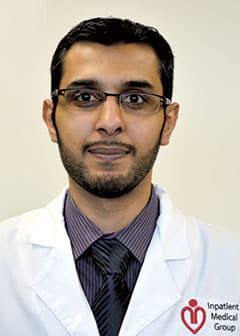
To continue working well, 24 hours a day, nonstop, your brain needs a constant supply of both oxygen and nutrients. When this steady flow of oxygen and nutrients is stopped or interrupted, the result is a stroke. Even if a stroke only lasts a few minutes, brain cells begin to die. That’s a scary thought.
What’s even scarier, nearly 795,000 people will suffer a stroke this year. So how can you make sure that you aren’t one of them? Start by learning about the key risk factors, including high blood pressure, diabetes, heart disease, smoking, being overweight and having a family history of stroke. Yes—you read that correctly.
While most people think of family history as it relates to cancer and heart disease risk, stroke isn’t often included. But perhaps it should be. To better understand the genetics – stroke connection, Rizwan Bashir, MD, a neurologist and neuropsychologist with Gwinnett Medical Group answers some of the most common questions:
Q: Is there a gene that predisposes someone to having a stroke?
While no specific “stroke” gene has been identified, there are several genetic factors that contribute to an individual’s risk of stroke. The best way to identify these factors is to understand your family history. Let your medical practitioner know if you have a family history of high blood pressure, high cholesterol, diabetes, stroke or cardiovascular disease.

Being genetically predisposed to any disease doesn’t mean you’ll necessarily get that disease.
Q: Are some people at higher risk of stroke?
While stroke can occur at any age (even babies), generally, the older you are, the higher your risk. Increasingly, though, stroke is happening to younger people, possibly because obesity increases the likelihood of high blood pressure and diabetes.
Stroke is more common in women than in men. In addition, birth control pills and pregnancy can increase stroke risks for women.
In addition to the most common risk factors, stroke is higher amongst people with conditions like sickle cell disease, atrial fibrillation, peripheral artery disease or carotid artery disease. Stroke is also more likely among people who smoke or are obese.
Q: What are the best ways to prevent stroke?
According to the American Heart Association, about 80 per-cent of clot-related strokes may be preventable. If you have any of the high-risk factors I’ve mentioned, seek treatment and modify your lifestyle to lower your risk.
The earlier you manage your lifestyle for general good health, including not smoking and keeping your blood pressure, weight, and cholesterol under control, the more you’ll lower your lifetime risk of stroke and other cardiovascular diseases.
Comprehensive care when you need it most.
There is no doubt that stroke is scary, but with a comprehensive stroke program at Gwinnett Medical Center’s, your customized care will begin the moment you call 911. With GMC’s Stroke Alert process, you will be placed in a dedicated stroke unit, with a team of specialty-trained experts.
You will receive a personalized treatment plan tailored to suit your unique needs. This may include tissue plasminogen activator (tPA), which is the only FDA-approved clot-busting medicine. Even after you have a stroke, GMC offers an extensive range of treatment options and services to ensure the best health outcome possible. Learn more at gwinnettmedicalcenter.org/stroke.

